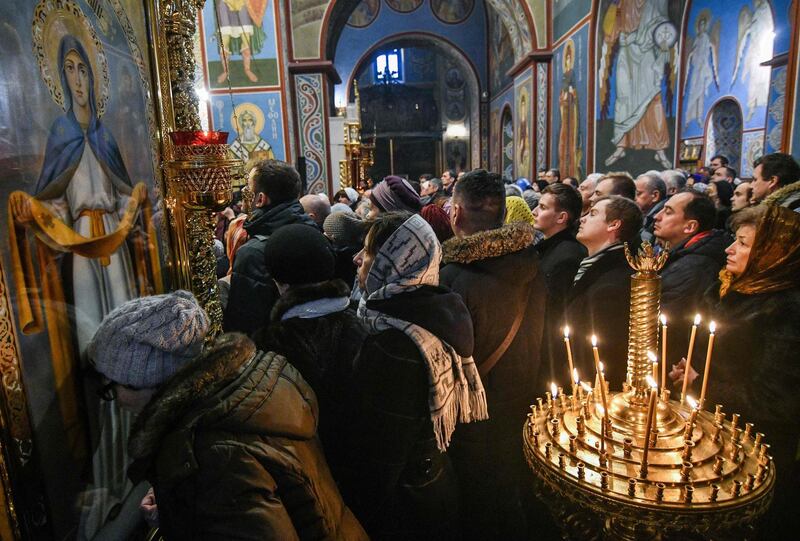The process of creating an independent Ukrainian church removed from Russian influence has dominated recent news from eastern Europe.
The decision on December 15 to elect Metropolitan Epiphany, 39, as head of the new Ukrainian Orthodox Church is a momentous development.
It marks the last stage in a process establishing an independent church recognised by the leading figure in the Orthodox world and is the culmination of many years of hard work of religious leaders and politicians.
In the past 30 years, Ukraine has been through five presidents, open aggression from Russia and the break-up of the Soviet Union. The idea of an independent Ukrainian church persisted throughout these turbulent times and has become a reality this year.
The religious picture of Ukraine is complex. Since independence in 1991, there have been three churches competing for dominance.
The first is the Moscow Patriarchate, a Ukrainian church subordinate to the Russian Orthodox Church. It has the largest number of parishes in Ukraine.
Because of its connection with the Russian Orthodox Church, it was widely recognised by the other Orthodox Churches.
The smaller Kiev Patriarchate, from which the newly appointed Metropolitan Epiphany comes, and the Ukrainian Autocephalous Orthodox Church have operated without official recognition since the 1990s.
They have been the main instigators of a break with Russian influence and the establishment of an independent, unified church.
On October 11, Ecumenical Patriarch Bartholomew in Istanbul, regarded in the worldwide Orthodox Church as the “first among equals”, decided in principle to grant autocephaly, in effect recognition of independence, to the Ukrainians.
He then abolished what he considered to be a temporary measure dating from 1686. In that year, Dionysius IV, gave permission to the Patriarch of Moscow to ordain the Metropolitan of Kiev.
The Ecumenical Patriarchate decided that the 1686 decision had come to an end due to a number of breaches of its terms, including non-recognition of the overarching authority of the Ecumenical Patriarch and the failure of the Russian Orthodox Church over the past 30 years to address the split in Ukraine.
Given the silence of the Ecumenical Patriarchate on this issue for more than 300 years, the Russian Orthodox Church was taken by surprise.
In response, the Russian Orthodox Church decided to break all ties with the Patriarchate of Constantinople. The result has been a huge split in the Orthodox world and a huge blow to its unity.
There are about 150 million followers of the Russian Orthodox Church out of 300 million Orthodox adherents worldwide.
Its biggest effect will probably be felt in diaspora communities such as that in the US, where those baptised in the Russian Orthodox Church will not be able to take part of services or sacraments at a church that is under the jurisdiction of the Ecumenical Patriarchate.
The annulment of the 1686 decision allowed the territory of Ukraine to be returned to the jurisdiction of the Ecumenical Patriarch in Constantinople, until the head of the new Orthodox Church in Ukraine receives the formal decree of independence, expected to take place on January 6.
The idea for an independent Ukrainian church first emerged in 1921 during the short-lived Ukrainian National Republic but the idea did not gain momentum until after Ukraine became independent in 1991.
In the first years of Ukraine’s independence, its ecclesiastical life was turbulent with frequent changes in the church structures.
They included the Russian Orthodox Church charging Metropolitan Filaret with leading the Moscow Patriarchate into schism in 1992, a failed church unification attempt the same year and the appointment of Filaret as a head of the Kiev Patriarchate in 1995.
As early as 1993, Ukraine’s first president, Leonid Kravchuk, sent a representative to discuss the possibility of autocephaly with the Ecumenical Patriarch.
President Leonid Kuchma kept a more balanced approach towards the autocephaly question, while president Viktor Yushchenko worked hard for autocephaly and unification of all the Ukrainian churches, but with little result.
The war with Russia in Ukraine’s east and the annexation of Crimea in 2014 revived the religious battle over autocephaly. The Moscow Patriarchate has often been portrayed as a mouthpiece for Russian President Vladimir Putin.
It has been criticised by the Ukrainian administration for its role in the war, with claims that it has sided with pro-Russian forces.
President Petro Poroshenko has often described Russian interference in Ukraine’s religious life as a matter of hybrid warfare and portrayed the push for church independence as a national security question.
The Euromaidan protests at the end of 2013 and beginning of 2014, and the ensuing annexation of Crimea, provided a valuable boost to Mr Poroshenko’s bid for church independence.
The protests, which were triggered by the failure to sign the Association Agreement with the EU, resulted in more than 100 deaths, with many more injured.
Mr Yanukovich fled the country in February 2014 and Mr Poroshenko won the following elections in the first round with his pro-EU stance and the promise to reclaim Crimea and the eastern parts of Ukraine.
During his presidency, Mr Poroshenko used the entire state machinery to persuade the Ecumenical Patriarch of Constantinople to grant autocephaly.
Next year will be a test for the independent Orthodox Church in Ukraine. Uncertainty looms over the future of the Moscow Patriarchate, which does not recognise the newly founded church and considers itself to be the only legitimate Orthodox church in Ukraine.
Next year will be an election year in Ukraine, which means that we might again witness the involvement of politics in Ukraine’s religious life.
Andreja Bogdanovski is a PhD researcher at the University of Buckingham in the UK, where he studies church politics in the Eastern Orthodox Church






